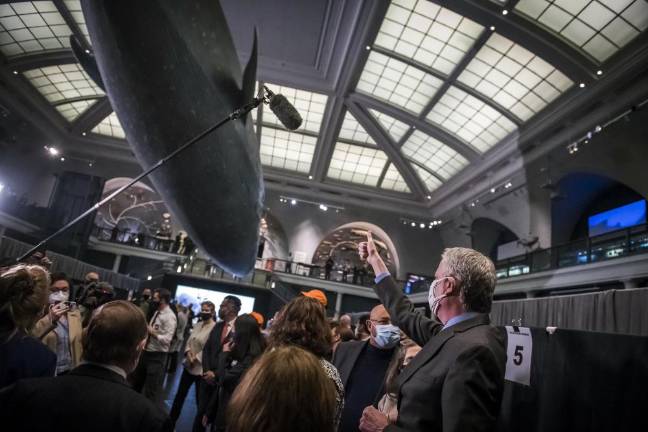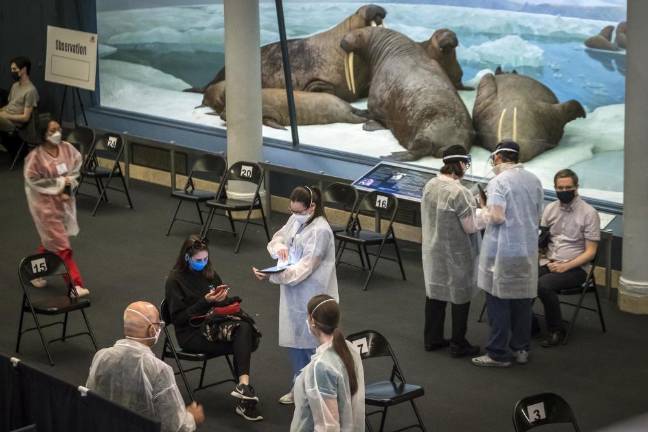Beyond the Blue Whale
As the vaccination rate plummets, de Blasio and others explore incentives for hesitant New Yorkers


There is a big caveat hidden in Mayor Bill de Blasio’s declaration that New York City would fully reopen this summer.
“Right now, we’re seeing absolutely consistent, striking progress directly, causally related to the vast number of vaccinations,” the mayor explained. On that striking progress rests what the Mayor described as his “goal” of full reopening on July 1.
He did not mention one worrisome data point that stands between us and the New York Summer he is promising: The rate of vaccination – the number of jabs each day – has plummeted in the past few weeks.
This decline is national, but has been far steeper here. A look back at the past month shows the disturbing trend.
On Thursday, April 1, a total of 113,499 doses of vaccine were administered, the city health department reports. The next week, Thursday, April 8, the number was 115,616. That was also the best single day in the city’s vaccination campaign.
By Thursday, April 15, daily doses had fallen to 88,203 and on Thursday, April 22 the number was down to 73,050.
Last Thursday, April 29, only 58,704 doses were distributed in the city, nearly a 50% fall from the April 8 peak (the vaccination rate has declined nationally by about 20 percent).
This decline is disturbing although not all that puzzling to city officials. “We got to the low hanging fruit and now 2ish million folks left,” said one.
The challenge ignited a big discussion about incentives to get more hesitant New Yorkers vaccinated.
$100 Vouchers
Ray McGuire, a mayoral candidate, suggested the city offer $100 vouchers to encourage the unvaccinated to come in. The voucher would be good at New York businesses, thus boosting recovery both by curbing COVID-19 and pumping spending money into the economy. McGuire, a former top executive at Citigroup, said the city could use $100 million in stimulus money to pay one million New Yorkers to get jabbed.
“I’m not sure,” de Blasio responded on the Brian Lehrer show. “I understand the impulse. I think that adds up very quickly. But we’re going to look at different kinds of incentives. Where I would agree with him is we need incentives ... Whether that one’s the right one, I want to think about that some more.”
The mayor suggested the biggest incentive was an almost back to normal summer. “The simple message to all New Yorkers, if you have not gotten vaccinated, it’s the time right now. It is easier than ever. And if you like this idea of a full reopening, I think the vast majority of New Yorkers do, go out and get vaccinated if you haven’t already.”
The mayor also channeled his inner John Lindsay to suggest that vaccination can be a happening:
“I want to particularly urge your listeners, Brian to experience what I experienced at the American Museum of Natural History. Get vaccinated under the whale, memorable – experience you will remember your whole life. And you’ll get free admission to the museum in the bargain.”
Visiting the blue whale is just one example of an inducement, the mayor stressed. “We’re going to be doing a lot more of those kinds of exciting opportunities and incentives. But so long as we keep moving on vaccination, we have the real potential to have everything open, full strength.”
The mayor urged unvaccinated New Yorkers to use the city’s website vax4nyc.nyc.gov or call 8-7-7-VAX-4-NYC.
Threat of Resurgence
The Health Department reports that as of May 1, 3.6 million New Yorkers, or about 41 percent of the population, have received at least one dose of vaccine. Of those, 2.5 million, or 31 percent are fully vaccinated.
This is not broad enough vaccine coverage to stop the pandemic on its own, although the combination of vaccines with non-pharmaceutical interventions, such as masks, distancing and cleaning, does seem to have put the virus in retreat.
The average number of new COVID-19 cases has fallen from a peak of over 6,000 a day in early January to under 2,000 in the past few weeks. But this citywide rate is still above the city’s goal of having fewer than 550 new cases a day. As the surge of COVID-19 in India makes dramatically clear, so long as this coronavirus circulates, resurgence remains a threat.
City and state officials have avoided using legal or employer power to force vaccinations. This gap was painfully dramatized by the death last Wednesday of veteran police officer Michael Mundy. Munday lived in Brooklyn and worked the midnight shift in the 77 precinct in Crown Heights. Crown Heights was put on the city’s “watch list” last September for potentially high rates of COVID-19. In March, the case rate spiked above city and borough wide averages.
“We cannot comment on individuals,” a Health Department spokesman responded when asked about Mundy’s death and whether he had been vaccinated. “The City is strongly recommending all New Yorkers, including City workers, get vaccinated.” Recommends but not requires.
There is one encouraging piece of data. That is the number of New Yorkers who show some level of antibodies to COVID-19, whether from having contracted the virus or from being immunized against it.
So while just over 40 percent of New Yorkers have had at least one dose of vaccine, the number testing positive for antibodies has now crossed 60 percent. There is no research establishing what level of protection is conferred on individuals who test positive for antibodies, nor, therefore, how many people overall would need to test positive to mark the often mentioned but vaguely pinpointed “herd immunity.”
Yet if the city can stabilize inoculation even at the reduced rate of, say, 50,000 doses a day, the number of New Yorkers testing positive for antibodies will likely exceed 70 percent by the mayor’s July 1 reopening goal. Public health officials are watching to see if, as much as anything, will curtail the pandemic in New York.
Mayoral candidate Ray McGuire, a former top executive at Citigroup, said the city could use $100 million in stimulus money to pay one million New Yorkers to get shots.